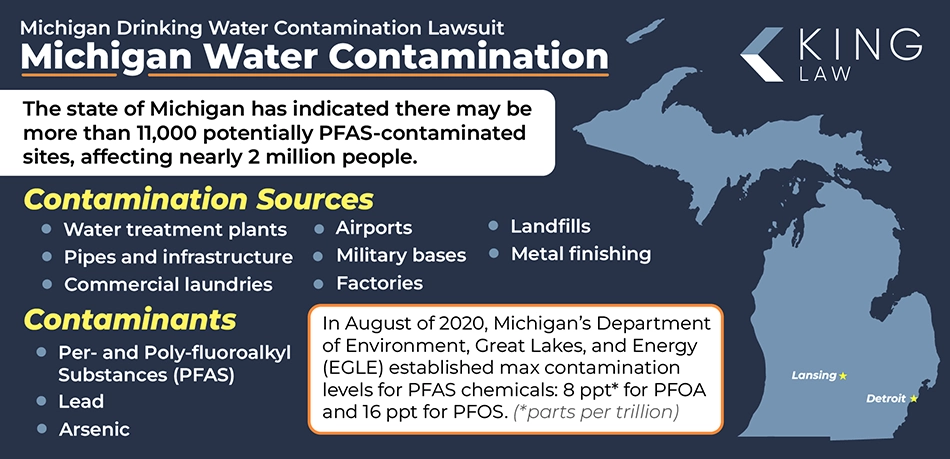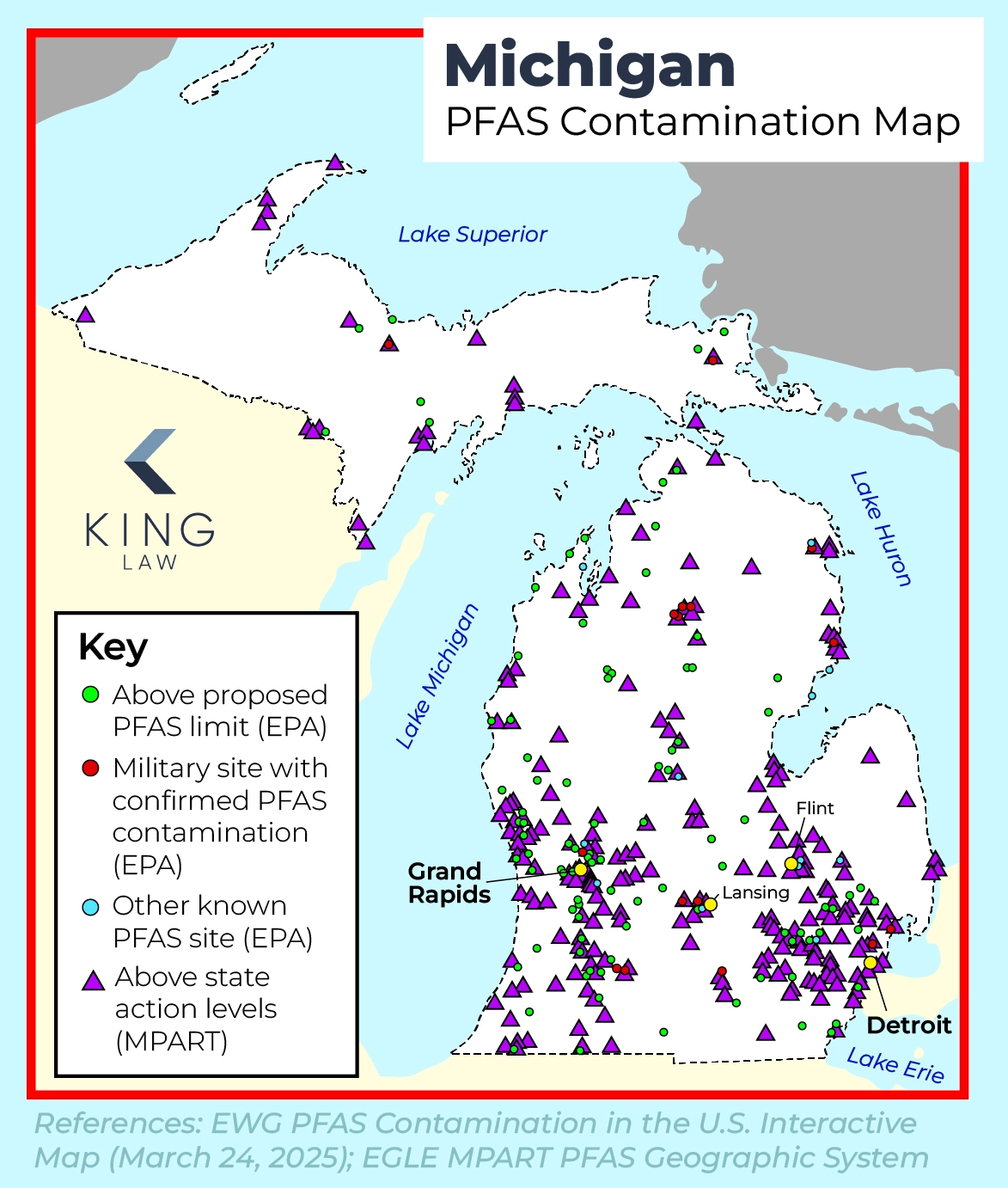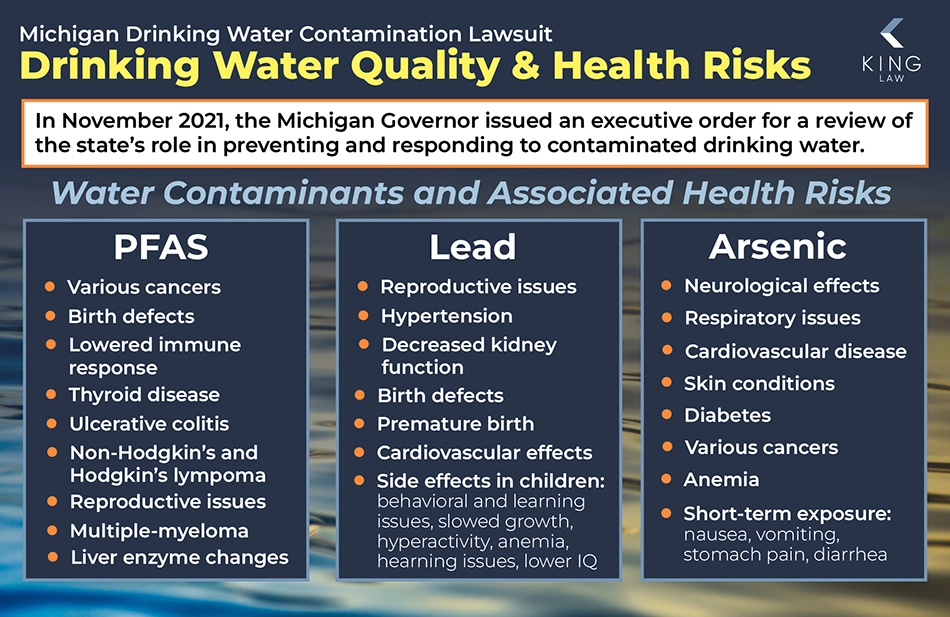
Michigan has a long history of drinking water contamination and lawsuits filed over that contamination. Environmental contamination from PFAS chemicals has invaded the water systems in the state. PFAS and other dangerous chemicals and elements are alleged to have contributed to cases of kidney cancer, liver cancer, testicular cancer, thyroid cancer and disease, and ulcerative colitis.
Current investigations look at how Michigan’s state water became contaminated. Some of the primary sources of contamination are industrial waste disposal sites in Rockford, specifically the company Wolverine Worldwide, a footwear manufacturing company. The state of Michigan indicates that there are currently over 11,000 sites throughout the state that potentially are contaminated with PFAS. Many of these contaminated sites have leached dangerous chemicals into Michigan’s drinking water.
Michigan Water Contamination Lawsuit Overview
Individuals across the country may be eligible to file lawsuits in relation to PFAS (per- and polyfluoroalkyl substances) exposure through contaminated water systems. PFAS are humanmade chemicals that are highly prevalent in the environment and dangerous to human health. Sites throughout Michigan have tested positive for high levels of PFAS contamination.
For example, Wolverine World Wide, in Kent County MI, is a footwear manufacturing company that has previously been sued for its landfill, which was highly contaminated with PFAS. The company uses PFAS to waterproof their shoes. Chemicals from this site eventually contaminated private wells, which are the water sources for many homeowners in the surrounding area.
Another example of water contamination in Michigan comes from fire-fighting substances. AFFF, or aqueous film-forming foam, is an active component used to put out fuel-based fires on military bases. The Wurtsmith Air Force Base in Oscoda, Michigan, was used by the Air Force as a training base for over 70 years. In 2010, it was identified as an area of investigation due to the PFAS concentrations. The base was closed in 1993 and has since had over $85 million to clean up the Air Force site.
Michigan as a state has launched a state-wide pickup and disposal program of AFFF chemicals which had collected over 60,000 gallons of the AFFF chemical as of April 2023.
Individuals who lived at or near military bases who were diagnosed with diseases related to PFAS exposure may be eligible to file a claim for the military water contamination lawsuit.
Timeline of Water Contamination in Michigan | 2025 Update
January 2025: President Donald Trump limits the EPA’s guidelines regulating PFAS levels in drinking water through an executive order. This essentially halts the existing proposed limits intended to limit PFAS in drinking water.
December 2024: Keeler Brass Company settles a lawsuit brought by Michigan’s Attorney General Dana Nessel. The settlement requires Keeler to investigate their former locations for PFAS, TCE, and VOC chemicals and then properly address them through clean-up actions.
April 2024: The U.S. Environmental Protection Agency has proposed their final national standard of PFAS levels for drinking water. Michigan adopted their own PFAS regulations in 2020, and the state is considered a leader in health and environmental protection from PFAS contamination.
September 2023: Kent County Circuit Court takes on a lawsuit against Gerald R. Ford International Airport Authority and its association to PFAS contamination. The lawsuit alleges that the Airport Authority should be liable for the release of PFAS chemicals into residential water wells.
January 2023: Asahi Kasei Plastics North America Inc. has settled a lawsuit from the Michigan County Circuit Court. The settlement is part of a Consent Decree that will require Asahi to investigate and then allocate resources to clean up areas that the facility has potentially contaminated with PFAS beyond the state’s permissible levels.
September 2022: Dana Nessel, Michigan’s Attorney General, files a lawsuit against FKI Hardware Inc, who allegedly contaminated areas throughout the Western and Southwest regions of Michigan with PFAS.
November 2021: Attorney General, Dana Nessel, has joined 19 other attorney generals throughout the U.S. to urge the Senate’s Environment and Public Works Committee to address PFAS contamination at a congressional level.
February 2020: Wolverine Worldwide settles for $69.5 million to provide municipal water service to the over 1,000 individuals whose water sources were contaminated by PFAS.
March 2010: The Michigan Department of Environment, Great Lakes, and Energy (EGLE) sampled the Wurtsmith Air Force Base in Oscoda for PFAS and found contamination in the groundwater.
About the Michigan Water Contamination Lawsuit:
Sources of Water Contamination in Michigan
Michigan’s Regulations for Drinking Water
Contaminants Found in Michigan Drinking Water
Current Water Quality in Michigan
Health Risks and Symptoms Linked to Drinking Water in Michigan
Eligibility Criteria for the Michigan Water Contamination Lawsuit
Michigan Water Contamination Settlement and Payout Amounts
How to File a Michigan Water Contamination Lawsuit
Statute of Limitations for Michigan Water Contamination Claims
Sources of Water Contamination in Michigan
There are multiple sources of contamination for Michigan’s drinking water. Contaminated drinking water can be found in homes, churches, schools, businesses, and others. The sources of the contamination vary based on many factors. Some of the sources of contamination may include wastewater treatment plants, military bases, airports, municipal water treatment plants, pipes and infrastructure, and factories. Other contamination sources include chemical and packaging manufacturing companies, commercial laundries, landfills, metal finishing, and AFFF-contaminated sewer systems.
On military bases and airports throughout the country, PFAS contamination has been identified from the use of PFAS chemicals in firefighting foam to suppress fuel based fires. Many of Michigan’s military installations may be the source of contaminants.
Military contamination sites: Selfridge Air National Guard Base, Detroit Arsenal, Jackson Readiness Center, Lansing Airport Hangar, Grand Ledge Army Aviation Support, W.K. Kellogg Airport, Ft Custer, Belmont Armory, Wurtsmith Air Force Base, Alpena County Regional Airport, MTC-H Camp Grayling- MATES, MTC-H Camp Grayling Airfield, Camp Grayling, MTC-H Camp Grayling- Cantonment.
Significant PFAS tests from the Environmental Working Group’s record of contaminated locations include:
- MTC-H Camp Grayling- MATES (2018): 7,810 ppt for PFOS
- Alpena County Regional Airport (2018): 82,000 ppt for PFOS and PFOA
- Wurtsmith Air Force Base (2018): 213,000 ppt for PFOS and PFOA
- W.K. Kellogg Airport (2018): 76,000 ppt for PFOS and PFOA
Michigan’s Regulations for Drinking Water
Since 2017, Michigan has had a PFAS Action Response Team (MPART), which was designed to identify, investigate, and take action to protect sites where the water has been contaminated by PFAS. Michigan’s Governor and Attorney General have taken numerous proactive steps to combat PFAS contamination throughout the state.
In August of 2020, Michigan’s Department of Environment, Great Lakes, and Energy (EGLE) established a maximum contaminant level (MCL) for PFAS contaminants. The tests were measured in parts per trillion (ppt) with a MCL for PFOA at 8 ppt and PFOS at 16 ppt, which are two common PFAS chemicals. .
Michigan has been a leader in transparency and proactiveness in tackling PFAS contamination throughout the state. The creation of the Michigan PFAS Action Response Team was established in 2017 and aimed to coordinate effective response to PFAS contamination.

Michigan Water Contamination Map
This map identifies locations that have tested positive above the maximum contaminant level (MCL) for PFAS in the state. Contamination sites range throughout Michigan, with significant levels of PFAS detected at military bases and in surrounding areas. The new federal regulation for PFAS establishes the national MCL at 4 ppt for positive PFAS tests. PFAS chemicals take thousands of years to break down and thus the chemicals continue to accumulate in the environment, humans, and animals. When the chemicals reach groundwater level, it creates the potential for contamination to expand.

Contaminants Found in Michigan Drinking Water
Toxic chemicals found in Michigan’s drinking water include PFAS, lead, arsenic, and others. PFAS is the overarching term for a variety of per- and poly-fluoroalkyl substances. High levels of PFOA and PFOS have been found in Michigan. Fluoride, nitrate and nitrite are also found at high levels in some areas and are identified as contaminants potentially harmful to human health. These substances are labeled as contaminants of concern because at high levels, they can lead to kidney cancer, liver cancer, testicular cancer, thyroid cancer, thyroid disease, and ulcerative colitis.
Per- and Polyfluoroalkyl Substances (PFAS)
Over 700 military bases across the country have been identified as being contaminated with PFAS or per- and poly-fluoroalkyl substances. Contamination from military bases and other industrial sites has impacted the quality of drinking water in Michigan.
PFAS is a key component of AFFF firefighting foams used on military bases, airports, and industrial sites to suppress fuel-based and high-temperature fires. Nicknamed “forever chemicals”, PFAS do not naturally break down. Thus they can accumulate quickly within the environment as well as living beings through exposure and drinking contaminated water. Exposure to PFAS chemicals has been linked to a number of health conditions, including some cases of kidney cancer, liver cancer, bladder cancer, thyroid cancer, and testicular cancer. The presence of PFAS in drinking water has led to thousands of people filing lawsuits against chemical manufacturers.
PFAS water contamination is a concern throughout the state of Michigan. Unsafe levels of these chemicals are linked to:
- Birth defects
- Bladder cancer
- Breast cancer
- Changes in liver enzymes
- Decreased vaccine effectiveness
- Hodgkin’s and non-Hodgkin’s lymphoma
- Leukemia
- Lowered immune response
- Multiple-myeloma
- Kidney cancer*
- Liver cancer*
- Pancreatic cancer
- Prostate cancer
- Reproductive issues
- Testicular cancer*
- Thyroid cancer*
- Thyroid disease*
- Ulcerative colitis*
*Represents condition our firm is accepting cases for
Lead
In 2019, Michigan updated its Lead and Copper Rule policy that would apply to public water sources—a proactive action to try and prevent another Flint water crisis. The largest source of lead contamination in drinking water comes from the lead service lines. These lead service lines were ordered to be removed from the water systems and better systems were put in place to detect high levels of lead. Public transparency about potential lead contamination risks is another part of the new order for lead regulation.
Arsenic
In Michigan’s groundwater, arsenic naturally occurs at a higher level. This has been a concern in Michigan because drinking water with high levels of arsenic may have harmful health impacts depending on the amount of exposure and an individual’s reaction to the contaminant. Arsenic presence in Michigan groundwater is not only due to the state’s geology but also industrial and agricultural actions, through the use of pesticides and fertilizers. While Arsenic is a common and naturally present element of the Earth’s composition, when it contaminates drinking water, the high concentration of arsenic can have negative health impacts. Symptoms of short-term exposure may include nausea, vomiting, or stomach pain. Longer exposure can be linked to certain cancers such as skin, bladder, lung, or prostate. Additional research in this field must be done to establish the connection.
Current Water Quality in Michigan
To this day, Michigan continues to face problems with regulating safe levels of various toxins in its drinking water. Some contaminants include E. coli, which is a bacteria that can cause kidney damage and other symptoms. Lead, PFAS, arsenic, and nitrates are other contaminants that are negatively impacting Michigan’s water quality.
Specific areas throughout Michigan have significant levels of PFAS contamination. These tend to be those of military bases and surrounding areas due to the environmental exposure from PFAS use on base.
Water Treatment Efforts in Michigan
The Clean Water Action organization in Michigan is one of many programs that aim to help maintain clean water quality. Other environmental programs, inspired by the Clean Water Act (CWA), have put into action regional and state programs designed for clean water management.
Michigan also has a Contamination Investigation Unit that looks to identify areas suspected or known to have a contaminated water system. This unit performs analysis and testing of drinking water, as well as assists in the regulation of administering practices for safe water.
Health Risks and Symptoms Linked to Drinking Water in Michigan
Long-term exposure or consumption of contaminated water can be harmful to one’s health. Various factors such as duration of exposure, concentration of contaminants, and specific contaminants can have differing severity of impacts after consuming. Common symptoms of drinking contaminated water can include vomiting, nausea, stomach pain, diarrhea, or bloody stool.
Injuries related to PFAS contamination injury can range from high blood pressure, to certain types of cancers, specifically kidney and testicular cancer. In 1993, Wurtsmith Air Force Base was closed and has since been identified as a site of high PFAS contamination. PFAS do not naturally break down and thus contamination accumulates over time and persists in the environment and human body.
PFAS exposure has been linked to various health conditions, including:
- Kidney cancer
- Testicular cancer
- Thyroid cancer
- Thyroid disease
- Ulcerative colitis
- Bladder cancer
- Non-Hodgkin’s lymphoma
- Hodgkin’s lymphoma
- Leukemia
- Male Breast cancer
- Prostate cancer
- Liver cancer
Consumption of water contaminated with arsenic may result in health conditions such as vascular disease, cancer, or diabetes. Michigan has naturally occurring high levels of arsenic as part of the state’s geology and erosion patterns.
It is important for individuals with prolonged exposure to contaminated water to consult with a medical professional.

Eligibility Criteria for the Michigan Water Contamination Lawsuit
Individuals who may be eligible for a Michigan water contamination lawsuit must have lived or worked in an identified contaminated area for at least a 1-year duration. Additionally, our firm is investigating cases of:
Our firm also looks for supporting documents such as medical records to prove diagnosis and proof of prolonged exposure through either residence or employment supporting documents.
To evaluate the potential for a lawsuit claim, consulting with an experienced attorney may help to ensure you follow the legal process and procedure properly.
Michigan Water Contamination Settlement and Payout Amounts
Our firm is investigating on a case-to-case basis. Individuals who may have consumed contaminated water for a prolonged period of time and as a result been diagnosed with a handful of injuries may be eligible to file lawsuits. Eligibility will vary, but our firm is looking at cases in which individuals have lived for at least 1 year after the year 2000 in an area that was identified to be contaminated.
Specialized attorneys may assist in evaluating potential for filing a lawsuit and they may provide guidance for the best approach.
Settlements can range greatly. Important factors include duration of exposure and specific diagnosis. There is potential for settlements to range from $30,000 to $300,000.
Michigan has historically struggled with water contamination from the Flint Michigan water crisis, to the present environmental efforts being made to maintain and regulate safe, clean drinking water.
Individuals may be entitled to compensation if they have been diagnosed with certain injuries in relation to exposure or consumption of contaminated water. Legal consultation will assist in evaluating a potential claim and merit.
The litigation process for federal lawsuits like the water contamination, may take months to years to resolve and reach settlement. Consulting with an attorney can provide expectations and information about the phase that the lawsuit is in. Additionally, attorneys can provide valuable assistance in gathering medical records and military service documents that may be from decades ago.
How to File a Michigan Water Contamination Lawsuit
The initial step to file a Michigan Water Contamination Lawsuit is to consult with an attorney experienced in environmental law or water contamination cases. Gathering documentation of exposure and relevant medical records is the evidence necessary for a water-contamination case. After hiring an attorney, they will assist in the legal proceedings in filing a lawsuit, ensuring there is the necessary paperwork and that the complaint is filed correctly. While most cases get settled before trial, should a case go to trial, attorneys will work with you in the discovery process to gather the additional details necessary for the case. Should your case go to trial, an attorney will represent you in court, advocating for your case.
Working with an experienced attorney is the best way to navigate the environmental and legal regulations to ensure that your case is represented effectively.
Evidence to Support Your Michigan Water Contamination Claim:
In order to substantiate a water contamination case, necessary evidence may include medical records, expert testimony, and environmental studies proving contamination.
Depending on the case evidence may include:
- Medical records of diagnosis
- Military orders (for exposure from military base)
- Expert testimonies
- Environmental studies
- Housing or apartment leases
- Property deeds
Statute of Limitations for Michigan Water Contamination Claims
Michigan has a statute of limitations of three years for personal injury claims. Statute of limitations is evaluated from date of injury (diagnosis) and in some cases from the date in which someone may have discovered they could file a lawsuit for their case. It is important to consult an attorney to help assess your case’s statute of limitations and evaluate the case specific details.
In some cases, people may be able to file lawsuits months or years after initial injury or diagnosis, if they had recently found out about the link between their injury and drinking contaminated water.
Michigan Water Contamination Lawyers
King Law’s team of attorneys is experienced in water contamination lawsuits. The firm’s legal team prides itself in responsive legal representation, document analysis, individualized evaluation, and personable legal guidance. The attorneys at King Law are knowledgeable in various states’ statutes and regulations to file lawsuits for water contamination. We make sure our clients are able to file claims properly and in a timely manner. Contact us today to schedule a free, no-obligation consultation.
Frequently Asked Questions (FAQs)
Learn more about water contamination in Michigan with answers to these frequently asked questions:

